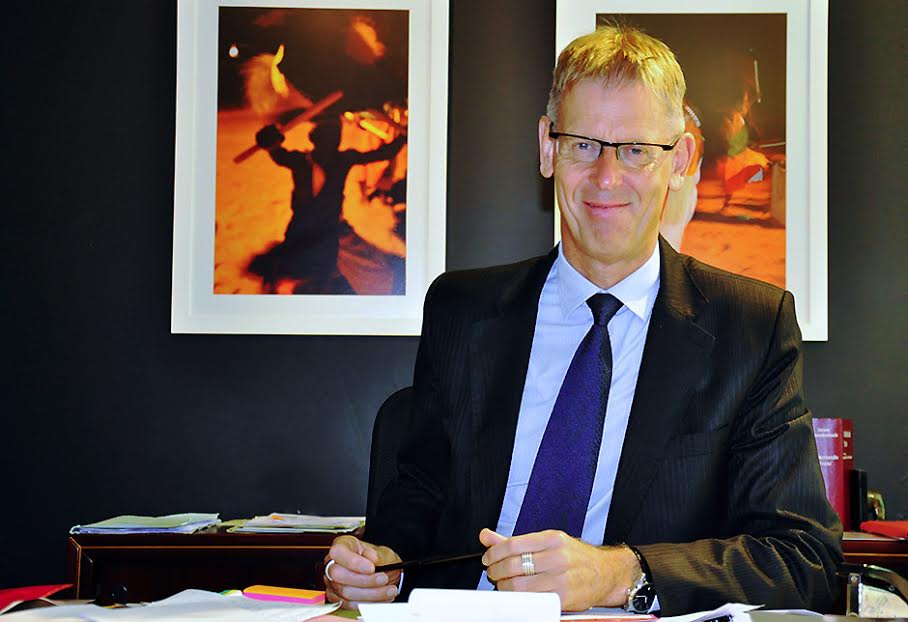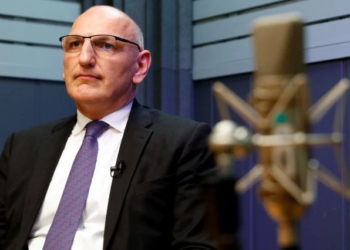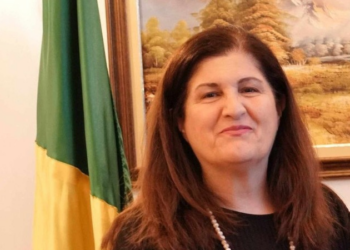Ambassador of Belgium acted in Brazil representing several fronts: political, sociocultural and environmental projects supported by Belgium.
| Oda Paula Fernandes
The Belgian ambassador, Josef Smets, met in Brasilia term of four years and left the embassy of Belgium in Brazil, last week, to take on new role in the Belgian capital. Active in social, Brazilian environmental and cultural causes, he met our country as few diplomats do. Smets visited Indian villages spreading through support for culture preservation and maintenance of the rights of indigenous peoples, projects for dissemination of indigenous culture, the recovery of human dignity with incentives for new perspectives of life for young people and adults of the slums, or situation social risk. Before leaving Brazil, the diplomat received the team at Embassy brasila for an exclusive interview on Brazil’s current political and economic situation. The ambassador also spoke of diplomatic life, friends and what impressions about our people and the future of Brazil.
Embassy Brasilia (EB) – Mr. Smets, since June embassy is in transition with the exchange of ambassadors and this August full four-year term as ambassador of Belgium in Brazil. What is your assessment about Brazil?
Josef Smets (JS) – For me, the discovery, the most important wealth is the people, the contact with Brazilian and I can say now, after four years here, that my true friends are Brazilians. I love to our fellow friends, but true friends are Brazilians. Here I saw the communicative power, opening the minds of people who have great willingness and desire to know Belgium, a European culture.

In World contest, Brazil’s image is always positive. We had here the visit of our government and asked one of our ministers is the image of Brazil, for the people there of Belgium was bad and he said no. Our image of Brazil is beyond political problems, it is the base that is being built and seeing the lives of Brazilians. I also see the harmony between the Brazilian and my country.
EB – How do you evaluate our society?
JS – This society, for me, is a society that is evolving every day, even with the political situation, I agree with some of my friends who have a lot of frustration, but I try to see the bigger picture and see that this country, this society is advancing and great strength is the fact that people talk about everything, has great mental opening, people discuss everything, people want to move forward in life. It is not a closed society. I will not mention other countries, but in my career I worked in several countries that are not democratic, that are not free, that does not have equality between women and men, and when I speak of equality speak of diversity as well. This is a huge force I see here because Brazilians are strong and mature. I am sometimes less pessimistic than my Brazilian friends who are watching the political situation and say “what a shame, all this is very bad,” but for me, as a diplomat I see this “forwarded” of this country. And I feel, I can not that this is the solution that the power is with the people of this country, I feel that the ability of people, the ability of expression is the most important aspect.
EB – Living in Brazil Mr. accompanies Close All as changes and OS developments. Engaged in Various Causes beyond the diplomatic policy, What is your Printing and YOUR Interference In Latest Political events in Brazil?
JS – During my tenure I thought, ah, agora will say something about this country, but this IS NOT Our diplomatic role. Our Role and observe, monitor Speaking of OUR Countries, Listening to PEOPLE, but not to give comments. Brazilians are mature PEOPLE HAVE MANY PEOPLE KNOW here que Very Well What Happens and What could improve. You have this consciousness. I’m here doing my mandate Situation Transition.
The We follow as 2014 Elections and Once speak Vez que worked in countries without democracy MANY aspects. And I see now, in Brazil, we are living a transition. It has a political class, without a doubt, which is nearing the end of a season. Brazilians want this change. From: Can not Talk to impeachment Why and A Process Totally Brazilian constitutional. I believe in justice From that country. I’m worried, but what a Personal Feeling What I will never comment because this is a process that we, Ambassadors, we can not influence and as diplomats HAVE contacts, talked with the Government and Ministers. MANY times tive A favorable PRINT About Practice Them. But I think That Need System Reform, politicians are hum System prisoners That Need Big Money. It Takes Split Politics and Business, and The Political Mandates Not Have A Separation Very good. My Concern Increased E que To Make A reform, I’m uh country Small and made several constitutional reforms to give more autonomy to regions, is this is a problem that both countries TEM (Belgium and Brazil), fast You gotta have hum mandate of the people and strong majority ESSA majority here NOT there. EVEN IF Win an election There is a strong coalition to make good policy. No This Left or center policy.
EB – Our democratic political system is still young, when compared with societies as European. This lack of decision of the people to take and recognize its key role in political life consciously have any connection with this immaturity or is a cultural issue of our state?
JS – The only thing I can say is that looking at the Congress, senators and representatives from that country, I have the feeling that these people fully represent the population. It has in Congress who have the instruments of power, but I see few women, young people and blacks involved with politics. This country is big and has a great diversity. And this diversity is also linked to politics, because I see that there is a distance between the reality of the people with the people who are in Congress. But this is a process where the people have to recognize that the National Congress to ensure that those who are there really represent the interests of the people in all their diversity. I am amazed how a country that has women acting ability and intelligence in various sectors, producing remarkably, only has 12% of women in Congress.
EB – The young Brazilians, you see involved with politics, concerned about the necessary changes?
JS – I recently spoke to a party boss and he said it’s not easy to make young people are interested in politics, they prefer to stay out, just looking. At the same time, I think with the instruments of power, if you want to change something, you have to enter political life. So I see this situation a little complicated. The country needs new people, people who have clean hands, which are not part of the system. I’d like to see the young Brazilians to engage more. They can change this situation, they have the strength for it and know what to do. I do not know who, or how, but I see a very great strength in this people. When I speak of the time of transition in politics it is because I see that young people have a mature and realistic consciousness. It has many people who criticize, I can understand it and the criticism because reading newspapers, (we read newspapers diplomats from various countries) I see that this new generation, these new people have to do better and they know it. And to do better you have to become more engaged not only with the criticism and opinions, but acting participate more in politics.
I visited several universities and in May was at the Federal University of Santa Catarina. It was an official visit with all the ambassadors of the European Union, at a seminar on the relationship Europe-Brazil. And several ambassadors spoke. There were about 300 young people in the room, a group of students who really represents the company of you. More than half were young people still, I saw many women, a racial mix and different social classes among themselves, most were families without much money. And looking at this audience in the room – because we were in a delegation where most were men diplomats, white and not young (characteristic of this profession) I thought, this generation is preparing, they still have no position in the political and economic life country, but I can imagine that they are not these traditional families always had the power in this country. It’s another generation. It is the change of Brazilian politics, representing the people in politics.
EB – Diplomats have a life of pilgrims during the career of time. How to reconcile family, friends and official travel?
JS – we got used to this routine. And diplomats it becomes natural.
For important countries, and Brazil is a very expressive world country, the ambassador must have experience in career. We have to travel a lot, know a lot about other countries. It is the fourth time I am head of state and 20 years ago I could not have access to this post, this mandate. As head of state, every diplomat can set the tone that your parents want to have; he can say that his parents only want to do business, period. I have the vision to say that the embassy has the vision to represent a country and a people. And a country is not only the official part, políticos- diplomatic relations but also our civil society, our public and our culture. I say that an embassy is a contact point for all these groups, not only to promote the visit of a Belgian minister or a Belgian company; really like to promote our business but also social projects. The Brazil left the group of countries that need aid from international NGOs, or private support, but we said that we should support all these cultural sectors. Diplomacy not only mean official contacts to meet more people, especially among open countries,
MS – What advice that Mr. will leave his successor?

Every day I change my opinion of Brazil. Uberlândia is an example of optimism despite the crisis there they have projects to grow. I like that the Brazilian way and I remember being in the airport and a boy came to. I will say to my successor: his title is not worth much, leave it aside.
EB – Ambassador, in addition to real friendships made here, what more Mr. will lead our country?
JS – The impression that you are really going to change things. The strength of the Brazilian woman. The open mind of a people who want to grow, want to move forward, not cling to taboos. The power of young people who are preparing to enter politics and change a time. The great and true friendships I made here. I love to see the geographical space which is huge, the outlook for the issues of nature, the search for quality of life. People like to work, know what their labor rights (salaries and vacations), rights of life and see that you will not let this go, as in other societies. When there were demonstrations for impeachment, had to stop the official activities for four days, then I said to my assistant who has dual nationality, Brazilian and Belgian: now will have many manifestations because it will be four days stopped. Then she told me no. Four days? People will go on vacation, do not have time for demonstrations! This is very Brazilian.






